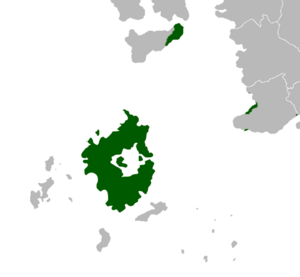Alstinian Civil War
This article is a work-in-progress because it is incomplete and pending further input from an author. Note: The contents of this article are not considered canonical and may be inaccurate. Please comment on this article's talk page to share your input, comments and questions. |
| Alstinian Civil War | ||||||||
|---|---|---|---|---|---|---|---|---|
| File:TBA | ||||||||
| ||||||||
| Belligerents | ||||||||
| Stephanites | Davidians | Geoffreyites | ||||||
| Commanders and leaders | ||||||||
| Stephan I Ryefield | David I Ryefield |
| ||||||
| Casualties and losses | ||||||||
| TBA | TBA | TBA | ||||||
The Alstinian Civil War (23 May 1684 – 4 July 1688), also known as the War of the Three Brothers, was a civil war in Alstin that was fought over control of the Alstinian throne. The wars were fought between supporters of the three rival claimants of the royal House of Ryefield; All of whom were the sons of King Julian I Ryefield and were all separately proclaimed as King of Alstin. The claimants were:
- Stephan I Ryefield, Duke of Robsport
- David I Ryefield, Duke of Daviston
- Geoffrey I Ryefield, Duke of Carmont
The conflict resulted in the legal extinction of the House of Ryefield in 1688, resulting in the transition of the Kingdom into the United Republic. The conflicy also resulted in the Colony of Mierria to declare independence as the Kingdom of Mierria, which persist as a de facto independent state until the end of 1723.
Background

For most of Julius I Ryefield's reign as King of Alstin, the Kingdom enjoyed a period of great cultural progress and economic growth, as Alstinian trade prowess enabled the growth of its influence to grow in South Crona, and the Kingdom sponsored colonial ventures in what is now modern-day Mierria and the Betlands. Concurrent with this progress however, were a series conflicts throughout the Orixtal Sea that necessitated Alstinian involvement; The prominent of which werethe the Orixtal Crusade from 1650 to 1656, the Keldonian Expedition of 1659, and the First Deralvecan War from 1663-1666. These conflicts would invariably spur discontent at home, as much of the populace pushed for a series of reforms, from increased representation in Parliament, to the abolition of Slavery on moral grounds; All of these attempts however, were stonewalled as conservative nobles in Parliament, with clandestine, unofficial support from certain members of the Royal Family, consistently blocked discussions of reform through procedural tricks and political intimidation.
War with the MLNC
Disputes over trade concessions in the Northern Orixtal with theMartillien North Levantine Trading Company, as well as lingering religious tensions, ultimately resulted in the outbreak of war in 1674. For ten years, the MLNC and the Kingdom engaged in a relentless naval war, with both engaging in vicious raids on each other's holdings. Nevertheless, neither side was able to gain a significant advantage over the other and damaging the international commerce of both in the process. In the end, both belligerents, after lengthy negotiations, agreed to a peace settlement that restored relations to status quo ante bellum, rendering the entire conflict as pointless in the eyes of the Alstinian populace.
The Tragedy of Prince Alstanus
TBA
Death of King Julius and the May Crisis
TBA
Tripartite Phase (May 1684- June 1685)
TBA
Davidian Ascendancy (July 1685-December 1686)
TBA
The Liberation Campaigns (July 1687-March 1688)
TBA
Endgame (April 1688 – July 1688)
TBA
Aftermath
TBA
Legacy
TBA